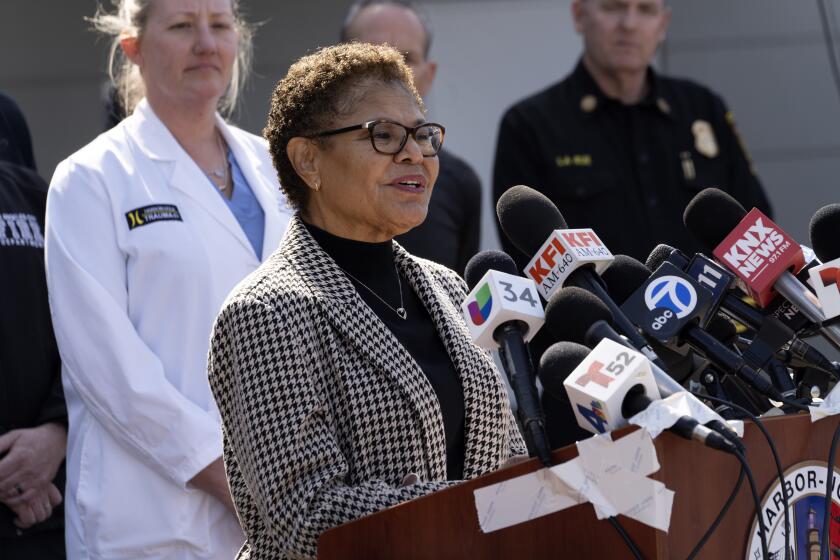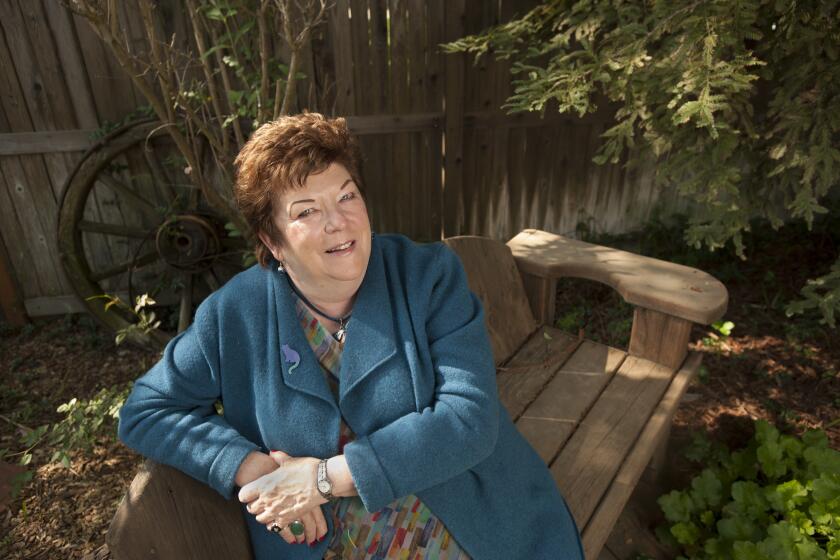Citing Prop. 22, Gov. Rejects Gay Marriage Bill
A day after California’s Legislature became the first in the nation to pass a bill to legalize same-sex marriage, Gov. Arnold Schwarzenegger announced through an aide Wednesday that he would veto the measure “out of respect for the will of the people.”
In a careful statement, Schwarzenegger press secretary Margita Thompson invoked the voter approval in March 2000 of Proposition 22, which said: “Only marriage between a man and a woman is valid or recognized in California.”
“The governor believes the matter should be determined not by legislative action -- which would be unconstitutional -- but by court decision or another vote of the people of our state,” the statement said. “We cannot have a system where the people vote and the Legislature derails that vote.”
The statement also said Schwarzenegger “believes that gay couples are entitled to full protection under the law and should not be discriminated against.” It did not offer his opinion on same-sex marriage, but when asked about it last year, the governor said, “I don’t care one way or the other.”
The California Supreme Court is likely to decide next year whether Proposition 22 and other state laws that define marriage are constitutional.
The issue burst into prominence in California last year when San Francisco Mayor Gavin Newsom directed officials there to issue marriage licenses for same-sex couples. The move drew thousands of couples to the city for highly publicized weddings before the state Supreme Court ruled that Newsom had exceeded his authority. Massachusetts allows same-sex marriages, but they derived from court order, not the legislative approval seen in Sacramento on Tuesday.
In addition to the likely court ruling on same-sex marriage, the issue may be headed back to the ballot: Opponents of gay marriage have been collecting signatures to qualify measures for the June 2006 vote that would ban same-sex marriage.
Schwarzenegger’s announcement sparked fierce reactions from advocates on both sides of the issue.
“The only reason that he could be doing this is that he is pandering to the far right,” said Assemblyman Mark Leno (D-San Francisco), the measure’s author.
Karen England of the Capitol Resource Institute, a Sacramento group that opposed the bill, said the governor had “kept his word against the runaway Legislature.... As a social conservative, I never thought I’d see the day when I said I was glad Arnold Schwarzenegger was the governor.”
Although 61% of California voters backed Proposition 22, recent polls have found views changing, with the state’s voters now evenly split on same-sex marriage. That voter ambivalence has made the issue increasingly perilous for California politicians -- and above all for Schwarzenegger as he gears up for a contentious fall campaign on his latest ballot measures and a probable 2006 reelection bid.
Already hamstrung by dismal popularity ratings, the Republican governor had little choice but to veto the legislation, analysts said. Approval of the measure would have set off a sharp backlash among Republican voters, his strongest remaining bulwark of support.
But while averting a conservative revolt, Schwarzenegger may have worsened a key political problem: erosion of his image as an independent reformer who stays above partisan politics.
“It will help to define him as just another Republican, and that’s not good for him in this state,” said Gary Jacobson, a political science professor at UC San Diego, alluding to California’s strong Democratic tilt.
For some Democrats, too, the Assembly’s final passage of the measure Tuesday brought risks, as the tight vote underscored. The measure passed with the minimum of 41 votes -- all from Democrats -- out of 80 members.
Particularly among Democrats seeking statewide office, support for same-sex marriage risks galvanizing conservative opponents and jeopardizing appeals to some of the centrist voters who dominate California elections. Opposition could alienate gay and lesbian activists and key Democratic liberals.
The issue has been potent. In 11 states last year, Republicans used initiatives to ban same-sex marriage to boost conservative turnout for President Bush in his race against Massachusetts Sen. John F. Kerry.
“In states that Kerry had to be competitive in, he was less competitive because gay marriage was on the ballot -- starting with Ohio,” said Tony Quinn, co-editor of the California Target Book election guide.
He likened the Legislature’s passage of the same-sex marriage bill to its approval in 2003 of driver’s licenses for illegal immigrants. For voters, that move captured the Legislature’s leanings -- more liberal than the statewide electorate, which booted Gov. Gray Davis from office, at least in part because of his approval of the measure.
When Newsom brought the issue front and center last year, Democratic leaders were split. U.S. Sen. Dianne Feinstein, the state’s senior senator, said the matter was “too much, too fast, too soon.” Sen. Barbara Boxer -- then running for a third term -- left her position vague, saying same-sex marriage should be left up to the states.
The party dynamics now, however, are far different. The top Democrats in the gubernatorial primary next June -- state Controller Steve Westly and Treasurer Phil Angelides, neither particularly well known across the state -- are competing for liberal support. Both said Wednesday that they would have signed the marriage bill.
“Signing this bill would have moved California forward on the right side of history,” Angelides said. Westly said the issue was “solely about respect and equality -- nothing else.”
As much as it affects the race for governor, however, the same-sex marriage issue could also affect a matter before voters in November: Proposition 77, which would strip lawmakers of their power to draw district maps. Some campaign strategists said lawmakers’ approval of same-sex marriage could buttress the case that the safe seats they drew for themselves have filled the Legislature with ideologues who can ignore the popular will.
There is a clear ideological cant to the issue, according to a poll last month by the nonpartisan Public Policy Institute of California.
Overall, it found that 46% of those likely to vote in November favor legalizing same-sex marriage, and 46% oppose it. While 56% of both Democrats and independents favored same-sex marriage, 68% of Republicans opposed it.
Mark Baldassare, research director at the institute, said Republican opposition to gay marriage has remained steadfast over the last five years. But the spate of gay weddings in San Francisco, along with the legalization of same-sex marriage in Canada, Spain and other countries, appears to have weakened opposition among Democrats and independents, he said.
Baldassare, and Democratic analysts, believe that as a result, same-sex marriage has joined the list of social issues such as abortion and gun control that California voters weigh to take the conservative measure of a Republican running for statewide office. Republicans who take conservative stands on such issues tend to win party primaries in the state but run into trouble in general elections.
Yet given Schwarzenegger’s unpopularity -- a Field Poll released this week found 56% of voters not inclined to back him for reelection -- he was all but forced to veto the same-sex marriage bill. The survey found that 70% of Republicans were inclined to support him.
“He is in a world of hurt, and he needs to find some friends somewhere,” said Democratic strategist Roy Behr. “The only people left supporting him right now are the most conservative people in the state.”
Still, the enduring split among voters on gay marriage was apparent in interviews around the state Wednesday.
“We already voted against gay marriage in this state, and it just keeps coming back,” said Marnie Bishop, 34, a Republican homemaker in the Central Valley town of Ripon.
In San Francisco, Armelle Cloche likened the Legislature’s approval of same-sex marriage to historic civil rights breakthroughs.
“You should be allowed to marry who you want,” she said. “It’s not something that hurts anyone else.”
Times staff writers Eric Bailey, Maria L. La Ganga, Richard Marosi, Monte Morin, David Reyes, Lee Romney and Robert Salladay contributed to this report.
More to Read
Start your day right
Sign up for Essential California for news, features and recommendations from the L.A. Times and beyond in your inbox six days a week.
You may occasionally receive promotional content from the Los Angeles Times.








